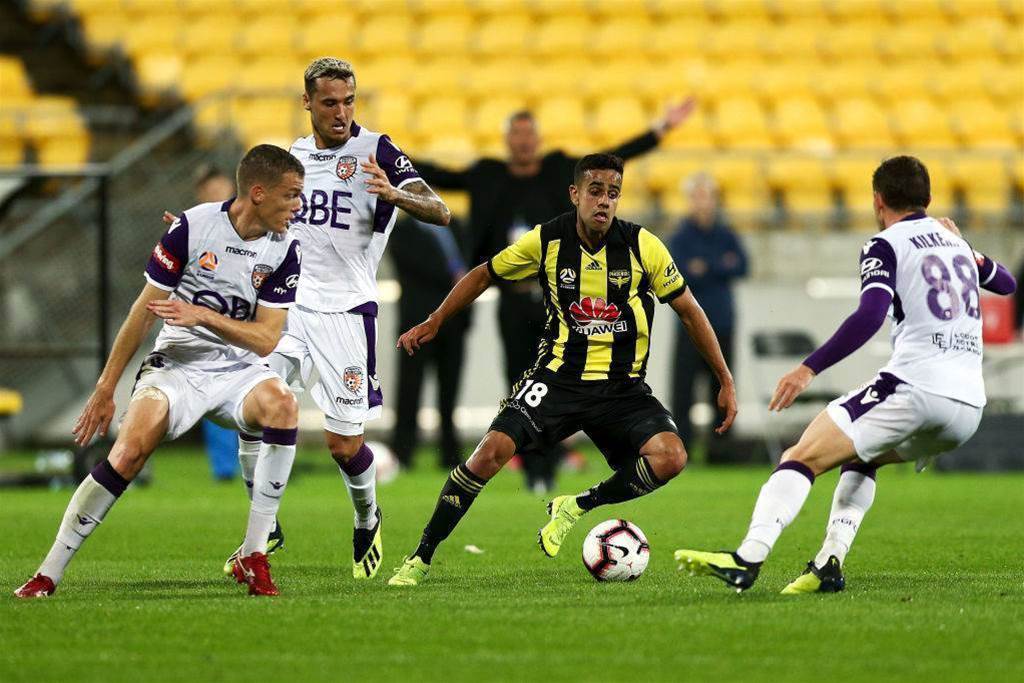New Zealand has one professional football club to Australia's 10. Yet the Kiwis still may have a growing advantage.
News that Wellington Phoenix prodigy Sarpreet Singh signed for Bayern Munich rocked the wider football public, with one of the world's biggest clubs snatching up the Kiwi talent.
"In Sarpreet we've recruited a technically gifted and very talented attacking midfielder," Bayern's renowned academy director, Jochen Sauer, lauded.
"We're very happy he decided to join Bayern."
If you're baffled that the Bavarian giants would ever consider Singh wouldn't join, and perhaps wondering why Munich were so keen on the mercurial Kiwi, there may be an interesting answer.
Especially if you're Australian.
It's not Singh's A-League form (five goals and eight assists last season) that caught the German giant's eye, it was his sensational performances in New Zealand's zany U20 World Cup run this year, where they were only narrowly eliminated in the Round of 16 to heavyweights Colombia on penalties.
It was an incredible performance by the young All Whites, but it's hardly a flash in the pan. Since Australia left Oceania, the Kiwis have punched above their weight in the majority of competitions they've entered.
Singh isn't alone in using the recent tournament as a springboard to bigger and better things, with New Zealand's ease of passage in qualifying for continental youth, Olympic and Confederations Cup tournaments resulting in a growing number of NZ stars jet-setting overseas.
It's an interesting qualm for Australia, who gifted our smaller rivals across the ditch confederation dominance when we shifted from Oceania to the Asian Football Confederation in 2006.
Australia hasn't qualified for an U20 World Cup since 2011 among a myriad of other disappointing results at youth level in ever-developing Asian competitions.
The question is: does the benefit Australia's youth receive from playing against a higher standard of competition in Asia outweigh the detriment of failing to qualify for major tournaments.
While there are opportunities for Australians to be noticed by Europe's elite outside of FIFA's showpiece youth competitions, it now becomes an issue of quality.
Even if Bayern Munich had scouted Singh in the A-League, would they have seen his performances in Australia's competition in the same light as those at an U20 World Cup?
Former Onehunga Sports coach and Singh's mentor, Hiroshi Miyazawa, says possibly not.

"Sarpreet's a special player," Miyazawa told stuff.co.nz. "He has been since he was seven or eight-years-old, when he turned up to our environment.
"But if someone asked me if I saw him playing for Bayern Munich one day I would still say no.
"It's just that Bayern Munich are a very special club. They can sign anyone in the world if they want to, but they chose to sign Sarpreet, which means a lot."
Singh was a little more lost for words.
"Words cannot describe how I'm feeling right now but I'm extremely excited for this opportunity to develop myself further here in Munich and represent my country and New Zealand football," Singh wrote on Instagram after the announcement.
Singh understands his responsibility in signing for the German giants casts well beyond his own career. The second coming of Wynton Rufer, Singh now holds the torch for football in an entire country.
But it's an increasingly enticing flame.
Wellington boss Ufuk Talay could barely contain his disappointment at losing the dynamic midfielder, but he had a reason to remain positive about the afterglow Singh's massive transfer may have on the club and New Zealand football.
"You don't expect to lose anybody but at the end of the day he's a young talent who has done very well and it's a great opportunity for the player himself," Talay told stuff.co.nz.
"One thing we can't do is stand in players' way when they have these opportunities. Is it a blow for me? Yes.
"Is Sarpreet a good player? Yes. Would he have been influential for us this season? I believe yes again.
"Whether it is the first team or the reserve team, they see the potential in Sarpreet and see that he can become an even better player.
"It's a big thing not just for Sarpreet but the Phoenix and New Zealand Football in general. I think it will open up the eyes of the players in New Zealand. We are the only professional club so this is where you want to be."
Singh's massive transfer is one of the biggest in the A-League's history...yet it doesn't have much to do with the A-League.
Talay is right to claim responsibility on the behalf of Paul Temple and the other hard-working staff at the Wellington Phoenix Football Academy, it was they, not the New Zealand FA, that are responsible for the fantastic talent Singh is today.
But Talay touched on something much greater when he noted that Singh's transfer "will open up the eyes of the players in New Zealand".
Turns out, young Kiwi talent may have a significant advantage over their Aussie brothers, one that may continue to widen as both the Asian and Oceania confederations grow stronger.
For us Aussies, maybe it's a lesson.
Maybe we abandoned our confederation, just when it could have benefited us most, to hop on an already brimming AFC bandwagon that never wanted us in the first place.
For awhile we chucked our weight around and seemed to have muscled out a place, but now we're on the outer, both in popularity and results.
Meanwhile, New Zealand's stepped up and taken our place in Oceania as best they could. They're more than just a big fish in a little pond, beating up on American Samoa while looking enviously over our shoulders into Asia.
They're becoming the source of inspiration for their confederation that we never were, launching the careers of Oceanian talent like Roy Krishna, and representing the confederation admirably at FIFA's showpiece tournaments. Soon they'll even have a direct route to World Cup qualification.
Singh's transfer is just a drop in the ocean. But that's the thing about Karma. It starts as just a little ripple, which speaks of bigger things to come.
Related Articles
.jpeg&h=172&w=306&c=1&s=1)
Wellington sell-out as Nix chase first ALM final spot
.jpeg&h=172&w=306&c=1&s=1)
Phoenix claim record ALW transfer in Fraser's US move













